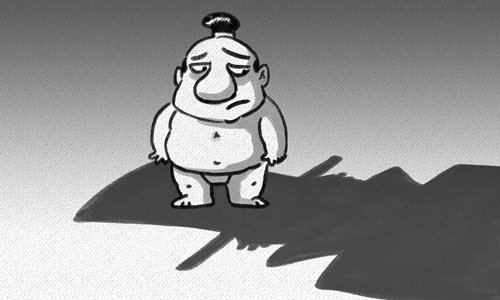HOME >> OPINION
Tokyo’s balancing act between China and US
By Da Zhigang Source:Global Times Published: 2019/5/23 18:33:41

Illustration: Liu Rui/GT
US President Donald Trump will visit Japan as a state guest from May 25 to 28. Japanese Prime Minister Shinzo Abe just visited the US in late April and Trump is scheduled to attend the G20 summit held in Osaka, a Japanese city, in June. It's rare for leaders of Japan and the US to meet for three consecutive months. Why are they meeting so frequently?
After Trump won the presidential election, Abe was the first foreign leader to meet with Trump. Since May 1, Japan has entered into the Reiwa era. Trump will be the first state leader to visit Japan after Emperor Naruhito's accession to the throne, which shows the importance of Tokyo-Washington alliance.
Trump and Abe do have several issues to discuss. The Korean Peninsula issue is one of them. Japan is concerned with denuclearization process and the issue of kidnapped Japanese nationals. Since tensions on the Korean Peninsula eased in 2018, Japan is the only country of the Six-Party Talks participants which has not held a summit with North Korea. Japan appears to have been relatively marginalized on the Korean issue and its voice and influence has been reduced.
Japan needs US support to realize its goals and to expand its influence on the Korean Peninsula. Before the summits between North Korean leader Kim Jong-un and Trump, Abe raised the abduction issue with Trump. Abe may be hoping to get US approval to explore ways to meet Kim.
Trade talks between the two nations would be another topic of discussion. Japan does not want to be the loser in Japan-US trade talks. Japan may make some concessions, but not many on agriculture, as an upper house election will be held in July, and Abe wants to see his ruling coalition to perform well.
The trade war between Beijing and Washington is heating up, and Japan has $68 billion trade surplus with the US. If the US cannot effectively reduce its trade deficit with China, it may put pressure on Japan, and ask Tokyo to make concessions.
Japan may expand its investment in the US to relieve the pressure from Washington in the trade talks and get favorable results. For example, when Abe visited Washington in April, he said Japan would invest $40 billion in the US automobile industry.
In the latest meeting in late May, the US may make a road map for Japan to accelerate the pace for a trade deal.
Beijing-Tokyo ties may be another subject. Japan would like to further cooperate with China. However, it needs to take into consideration the US, and would be concerned if closer cooperation with China would impair Japan-US relations. Since the end of World War II, despite its economic prowess, Tokyo has been unable to get rid of the restrictions and influence of Washington when it comes to diplomacy and politics. Beijing-Washington relations have a significant influence on Tokyo. Japan should try to avoid taking sides. This country needs to balance between the two giants.
Tokyo is dependent on Washington for security, but does not want to provoke China on security matters.
On economy and trade, Japan doesn't want its cooperation with China under the framework of the China-proposed Belt and Road Initiative to cause concerns in the US. For example, the Japanese delegations to the first and second Belt and Road Forum were led by the secretary general of the ruling Liberal Democratic Party, Toshihiro Nikai, instead of a cabinet minister.
How to successfully maintain a balance between the Beijing and Washington is a test to Tokyo's strategy and political wisdom.
The author is director and research fellow of Institute of Northeast Asian Studies at Heilongjiang Provincial Academy of Social Sciences and chief expert at Northeast Asian Strategic Studies Institute. opinion@globaltimes.com.cn
Posted in: ASIAN REVIEW